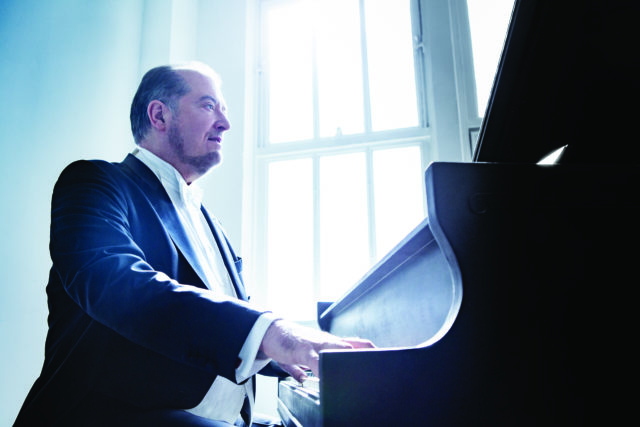
Pianist Garrick Ohlsson has, at last count, at least 80 concertos in his repertoire.
Yes, eight-zero, 80. “It’s absolutely possible,” Ohlsson says. “It’s probably more by now, but it doesn’t mean that I play them all, all the time.”
He admits that there are fewer than 10 that he could play at the drop of a hat — one of which, Rachmaninoff’s First Piano Concerto, he will perform with the Boulder Philharmonic and conductor Michael Butterman on Saturday (Jan. 19) in Boulder and Sunday (Jan. 20) in Federal Heights. Other works on the all-Russian program will be Alexander Borodin’s In the Steppes of Central Asia and Sergei Prokofiev’s Fifth Symphony.
Ohlsson has not visited Boulder recently, but he played at the Colorado Music Festival in the 1980s and ’90s. And there are other Boulder connections: He has performed with CU’s Takács Quartet and will be playing with them on an upcoming tour. And later in the year he and the quartet will record works for a piano quintet by Edward Elgar and Amy Beach.
Of Rachmaninoff’s five works for piano and orchestra, the First Concerto is relatively unknown — much less popular than the Second or Third Concerto, or the Rhapsody on a Theme of Paganini. But Ohlsson has no doubt that it is the equal of the more famous works.
“It’s a great piece,” he says. “It’s got incredible virtuosity, it’s got drama, it’s got gorgeous tunes, gorgeous orchestration, and so on. The opening is very dramatic, and there’s a lovely second theme. Then there’s a very beautiful, slightly melancholy summer-night nocturne, and the last movement is a romp.”
Rachmaninoff wrote the concerto for himself in 1891, when he was only 18, to show off his already extraordinary piano technique. He revised it in 1917.
“He was much more adept and skilled by that point,” Butterman says. “It’s very well orchestrated and the dynamics are very carefully balanced. He clearly knew what he was doing.
“I really love the piece — it’s got all the things that audiences love about Rachmaninoff.”
Ohlsson believes that the concerto should be played more often. “It’s a real winner and it’s compact and it’s gorgeous,” he says.
“I played it in Boston and a lot of the players said, ‘Why don’t people play this more? It’s really great.’ Some people say, ‘Oh, it’s so difficult.’ Yeah, it’s difficult but the second and third are at least as difficult and people play those all the time. That’s no excuse.”
After living in the U.S. and Europe for several years, Prokofiev returned to Soviet Russia in 1936. He soon wrote several important pieces, including Peter and the Wolf, music for Sergei Eisenstein’s film Alexander Nevsky and the ballet Cinderella. He wrote his Fifth Symphony in 1944, as World War II was ending. It was very successful and remains one of his best known scores, but not long after the premiere he suffered an accident and had to severely curtail his work.
Butterman said he has never conducted the Fifth, even though it is a piece he admires. He chose it for this program both because it goes well with Rachmaninoff, and is a piece “that we would enjoy playing [and] that the audience would enjoy. It’s certainly tuneful, and colorful as well.”
Butterman compares the music to Prokofiev’s two big ballets, Romeo and Juliet and Cinderella and, interestingly, to John Williams. “There are moments in the fourth movement where the music is buoyant and uplifting,” he says. “It could be Harry Potter.”
At the same time, Butterman hears a darker side to the symphony. “The first theme from the opening movement has a stretching, searching quality to it,” he says. “There’s a darkness to the piece, [with] a lot of low-frequency accents, and the tuba has a big role to play.
“[Prokofiev] had been lured back to the Soviet Union, and I wonder if he was already beginning to see that his horizons were going to be severely curtailed.” If so, the feeling was prescient: The composer was later censured by Stalin and spent the last years of his life as a virtual non-person.
The concert opener, Borodin’s In the Steppes of Central Asia, connects to both the Russian theme of the concert and the “open space” theme of the Phil’s season. “It’s a lovely work, a beautiful, very simple tone poem,” Butterman says.
“I love the beginning of it. It’s just this high harmonic in the strings, the aural equivalent of a haze. From that emerges an appealing theme, and then the clip-clop of camel hooves, as the caravan approaches. I think anybody who likes Borodin’s ‘Polovtsian Dances’ or anything by Rimsky-Korsakov is going to enjoy this piece.
“It’s an appropriate and soothing way to open up an evening of music.”
On the Bill: Boulder Philharmonic Orchestra, Michael Butterman, conductor, with Garrick Ohlsson, piano. Borodin: In the Steppes of Central Asia; Rachmaninoff: Piano Concerto No. 1; Prokofiev: Symphony No. 5. 7:30 p.m. Saturday, Jan 19, Macky Auditorium, Boulder;
2 p.m. Sunday, Jan. 20, Pinnacle Performing Arts Center, Federal Heights. Tickets: boulderphil.org














